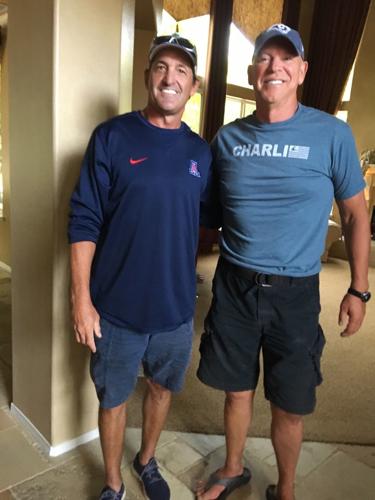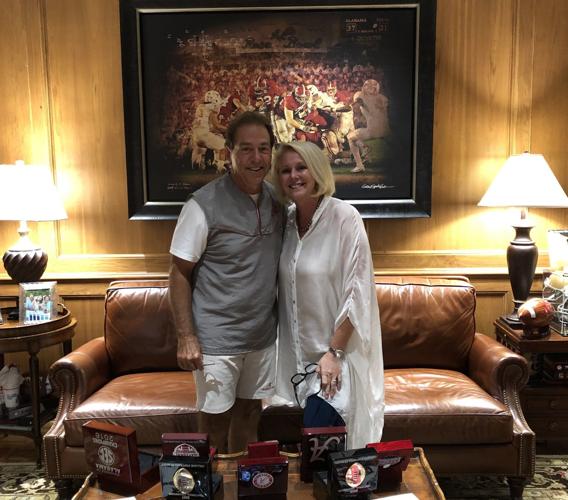Hawaii has a special place in the hearts of the Cecils. It is the place where my husband, Chuck, and I got engaged after one of his Pro Bowl games. While many believe the Sports Illustrated hype that he’s “Too Vicious for the NFL,” Chuck is a gentleman at his core. That magical night, he knelt down on one knee in front of eager onlookers and asked me to spend the rest of my life with him. My life was wonderfully changed forever. Not to be completely sappy as we’ve had our share of ups and downs, but I will say it’s been a magnificent ride — and it isn’t over yet.
Cut to this week in Hawaii. Saturday night marks Arizona’s 2019 season opener against the Rainbow Warriors. The start of every season brings a boiling pot of excitement and hope for wins, postseason play and trophies in our house — OK, more for me than Chuck. Chuck is all about the process, and rarely gets ahead of himself. From the time he played at Arizona to coaching on the professional stage, his philosophy is to stay focused on taking care of critical nuances. He told me last week that “Winning is in the details of the day-to-day. From being on time, solid practices, positive attitudes to getting each assignment, alignment and technique correct — if we do that, the results will take care of themselves.”
For me, I’m all about results. Bring on the wins, baby.

Chuck Cecil, left, and Mike Waufle talked defensive-line strategies this summer.
Catching up
This summer, Chuck and I worked from our office in Manhattan Beach, California — out of the summer heat of Arizona. As always, Chuck was obsessed with delving into new schematics, techniques and game plans for different positions. Improvement is in his DNA, and in July he took on the defensive line with Super Bowl-winning defensive line coach Mike Waufle. As the defensive coordinator for the Tennessee Titans, Chuck was responsible for the entire defensive game plan — however, he has passion to dive deep into the complexities of every position to bring value to the team. Between breaks in watching film, Coach Wauf and Chuck looked like two big dogs vacillating between a well-choreographed ballet and fighting over turf in the yard. It was fun to watch.

Nick Saban and Carrie Cecil
In the biz
I get asked a lot about what I do in sports. For many who have seen the ABC show “Scandal,” I am much like the sports version of Olivia Pope — a fixer.
I team up with high-profile franchise owners, general managers, players, head coaches, athletic directors and institution presidents to frame narratives to avoid a litany of scenarios such as … jail time, never working again or having their legacy dragged across shards of Google glass for months at a time. Sometimes I’m hired by high-powered agents or attorneys, and sometimes I work for the coaches directly.
Last spring, I handled crisis and reputation management for many of the cases that you may have read about in the sports section. Because I take a legal vow of confidentiality, I can’t “kiss and tell” about particular clients. I will say, from cases such as the Adidas FBI NCAA men’s basketball investigation, the owner of the New England Patriots snared in a sex-sting, the Ohio State sensational coaching saga to the death of a student-athlete at Maryland, there was no shortage of issues for crisis professionals in the complex and beautiful world of sports.
Avoiding a crisis
My work team believes in preparing our sports stakeholders so they’re ready for crisis.
Because the world of media and social media has changed the game, a penny of prevention is worth a pound of cure. We used to have 24 hours to respond to a crisis — like a loss of life, not just an NCAA infraction. Today we have 120 seconds; often times, the first to establish the narrative wins.
It’s a race to tell the story accurately and first.
While sitting in coach Nick Saban’s office last week before working with his team, I realized that he may be the only coach in the NCAA who is above having his brand sabotaged by an uninformed and inaccurate online social-media mob.
Then I was reminded of what happened to Joe Paterno’s legacy at Penn State. While the crimes Jerry Sandusky committed while on staff for Coach Paterno were horrendous, it’s virtually impossible for coaches to be responsible for hundreds of employees — particularly if they are hiding a twisted personal life.
Yet they tore down Coach Paterno’s statue.
Journalists often say to me that coaches “had to know what so-and-so was doing.” I remind them that many times we don’t even know what our kids or the person sleeping next to us are doing.
It’s insanity to blame many of these leaders or coaches for an employee’s behavioral issues. If Urban Meyer can be virtually tarnished due an assistant coach’s alleged behavior, any coach — championship-winning or not — can lose his job amid a wildfire of narratives.
Losing may no longer be the biggest liability for athletic stakeholders. It may be their lag in response time to control their narrative. The most critical element sports stakeholders can do is to be educated and to have a strategy or game plan ready to deploy.
I’ll wrap up with a story about a football coach who was one of my clients this year. He was so angry about false allegations that I thought he was going to have a stroke in the middle of my office.
He had every right to be angry, but I had to gently remind him what friend and former White House Press Secretary Jody Powell used to say: “When operating in the midst of a storm, it is important to find safe harbor and not curse the rain. Complaining about media coverage, fair or not, often feels good in the short term, but overall it is nothing but counterproductive. What you need is a vision and strategy to set the record straight and move forward. In other words, being pissed off is not a plan.”
Aloha, everyone — welcome back to the football season, and thanks for reading.





